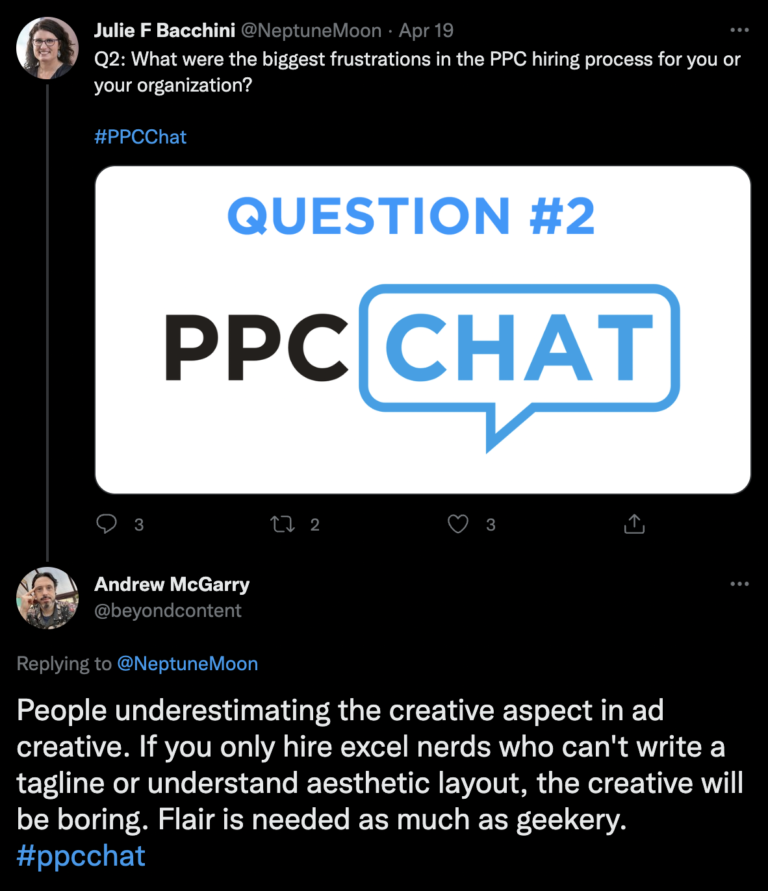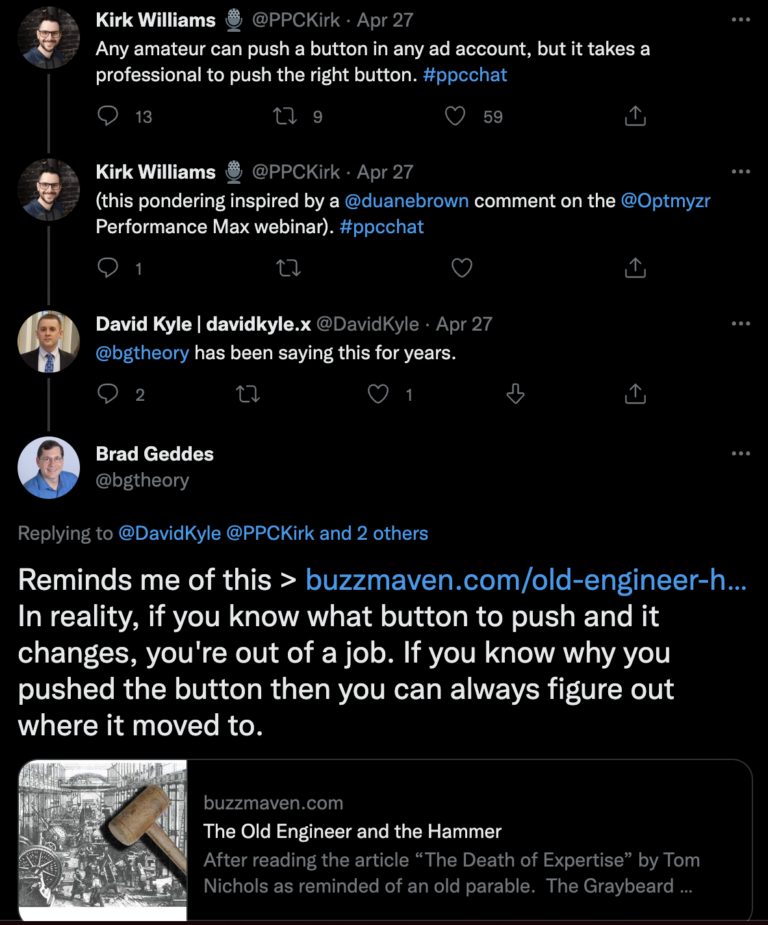Once upon a time, when everyone’s favorite ad platform was just learning how to walk, creative PPC managers would bid on common typos of a search term for a fraction of what the correct spelling would cost.
That piece of advertiser ingenuity was patched out, but its importance remains.
Today’s ad platforms are built on years of search behavior and advertising data and using the expertise and creativity of successful marketers.
So I empathize with anyone worried that another “patch” is coming as PPC platforms move toward more automated solutions.
That said, the majority of PPC specialists will ultimately be fine. There’s certainly some turbulence (especially with respect to data visibility), but the search marketers I talk to are largely confident that the industry will find ways to adapt.
For anyone not so sure about how to be a successful marketer in the age of PPC automation, I’ll cover:
- Changes you should be ready to deal with.
- Opportunities to consider pursuing.
- Must-have skills that will serve you well.
[Free Download:] Top PPC trends to shape your 2024 strategy
3 Changes To Prepare For
Adapting To New Privacy Regulations
FLoC, GDPR, CCPA – the past few years have been full of acronyms surrounding how privacy is addressed on the internet.
Between that and “walled gardens,” where each ad platform restricts what data users can see (including their own), PPC marketers are forced to rethink tomorrow’s campaigns.
Information that was readily available for use is slowly going away. So, instead of tracking users’ every move, it’s time to personalize ads by addressing people’s fears, dreams, pain, and concerns based on their interests.
In other words, it’s time to do some old-school marketing!
A More Holistic Approach To PPC
One of the biggest surprises when I started working in paid search, was how little emphasis some PPC teams place on the creative aspect of their ads.
Even today, I’m a little stunned by agencies that don’t employ any copywriters or graphic designers.
 Screenshot from @NeptuneMoon and @beyondcontent/Twitter, April 2022
Screenshot from @NeptuneMoon and @beyondcontent/Twitter, April 2022While I’m in awe of the data and Excel wizardry many search marketers pull off, winning top ad rank doesn’t mean much if your ad text isn’t relevant and catchy; it certainly won’t last very long.
Like it or not, paid search is becoming less about managing data and more about interpreting, influencing, and monitoring it.
Between privacy laws and issues with data visibility, it will become as much a creative channel as it is a mathematical one (if not more so).
Finding A Role For Automation On Your Team
It’s the evening of November 12, 2021.
A bug in the algorithms that govern Smart Shopping bids causes CPC bids to surge without warning.
Some of your accounts spend more than double what they typically do for clicks.
And because it’s happening between 6 p.m. on Friday and 3 a.m. on Saturday, you only find out after you’ve spent half a week’s budget in hours.
Or, do you?
If you had an alert set up to inform you when CPCs for certain campaigns exceed a threshold you set, you were probably able to limit the damage.
Perhaps you had an automated rule running to pause campaigns automatically under similar circumstances.
Automation layering is how successful marketers safeguard their PPC accounts.
These third-party tools create layers of automation such as alerts, scripts, and automated rules.
By increasing the number of barriers a platform-side error has to go through before impacting your account, you can be more efficient while buying time for manual intervention when things go wrong.
4 Big Opportunities To Pursue
1. How You Manage Campaigns
If ad platforms change the capabilities they offer and the amount of data they share with advertisers, it stands to reason that paid search pros will have to change the way they approach account management.
On a micro level, this means accounting for things like Smart Bidding using conversion data from every campaign in your account (even the ones you adjust manually).
When it comes to the big picture, it involves a ground-up restructuring of what we know account management to be.
When ad platforms automate the mathematics and science that humans can never equal them in, it’s time to turn our attention to what the machines can’t do:
- Targets: Finding the optimal ROAS and CPA goals for different campaigns.
- Structured data: Optimizing account structure, ad text, creatives, and product feeds.
- Conversion data: Sharing business data to prioritize profits over sales and customers over leads.
2. How You Use Data
Charts and spreadsheets are for paid search, as the saw and measuring tape are for carpentry.
But when ad platforms restrict how much data you have access to, challenges with targeting, measurement, and attribution are sure to follow.
Changing the role of data in your search marketing campaigns can liberate you from feeling shut out by ad platforms.
Here are some things I remind myself about frequently:
- I would rather own 25% of the data than borrow half of it.
- Attribution is not all-knowing, and it’s on me to plug gaps and test for incrementality.
- The more data I own, the more I can see paid search as a delivery method.
First-party data may not be the remit of paid search, and it’s certainly not something you can solve without client support, but every team should at least open the conversation.
3. How Your Clients See You
Like any other discipline, performance marketing can’t exist in isolation from a wider marketing (and business) strategy. Real-world events like the cost of shipping containers impact the degree of success you can bring to the table, making it unwise to operate in a silo.
Here are some roles you should play in addition to that of PPC expert:
Pilot
One role of the PPC pilot is to monitor, plan, and navigate the direction of campaigns. But, it’s equally important to chart a course that makes sense for the business.
Learn about their customers, understand their brand and values, and use their business intelligence to build standout campaigns.
Doctor
Frequent testing and zero hesitation in treating what’s not working are hallmarks of the PPC doctor.
While diagnosing issues in campaigns are table stakes, doing so in a wider business context makes you invaluable.
Expand your area of knowledge to how clients source product, close deals, and post margins.
Teacher
The toughest role is also the most critical.
Not only do you have to teach ad platforms what decisions are right for a given account, but you also have to get clients to buy in to and support changes in methodology.
In many cases, it involves undoing systems and conditioning you’ve put clients on to. Use the data to state your case.
4. How You Stand Out From The Crowd
Perhaps not something every PPC expert has explored yet; diversifying your offering is a great way to insulate yourself from being beholden to a single platform or channel.
While not everyone will go from specialist agency to full-service digital marketing shop, even a small expansion beyond your comfort zone can prove beneficial.
Some paths to consider include:
- Expanding your skillset to support multiple advertising platforms.
- Developing PPC-adjacent services like SEO and conversion rate optimization.
- Offering value-add services within PPC like audits, photography, or design.
[PPC Trends 2024] Download the free ebook →
5 Must-Have Skills To Develop
Copywriting
Perhaps the single most important marketing skill of the 21st century, copywriting underpins everything we do in digital marketing.
Many facets of PPC can’t excel without solid copywriting:
- Ad text for search ads.
- On-creative copy for display ads.
- Scripts for video ads.
- Landing page copy.
- Calls to action.
Successful marketers agree that messaging, positioning, and tone of voice are the three most important elements of a winning campaign.
How those are conveyed begins (and sometimes ends) with copywriting.
It’s also a powerful skill for promoting your own business and pitching to win new clients.
Creativity
I’ve heard from many people that PPC isn’t a creative marketing discipline. They’re all wrong.
From ad text that wins clicks to landing pages that get conversions, creative expression is woven into PPC just as much as content marketing or mainline advertising.
And when every advertiser has access to the same ad platforms and automations, how you use them is what separates truly successful marketers from average ones.
So, there are even more ways to display PPC creativity, including:
- Building and automating unique strategies, such as changing bids by weather.
- Using PPC channels to achieve other marketing and business goals, such as fundraising.
- Getting a dedicated budget for all your wild and crazy ideas.
Audience Research
Strong audience research is vital to all great marketing campaigns, but your PPC results can also provide insights that translate well across other marketing and business teams.
Some of the ways to turn PPC data into tangible opportunities for your clients and co-workers include:
- Testing messaging around different pain points to inform better website copy.
- Using in-market audiences to see who’s really interested and improve sales targeting.
- Gauging demand for new products before committing fully to sourcing or development.
Client Experience
A solid client experience is vital to both retention and acquisition. Not only does it give current clients a good reason to stick with you, but referrals bring in qualified leads with a high success rate.
If one of your concerns over automation is losing clients who would rather trust the ad platforms, improving your client experience is a great way to be seen as a growth partner.
How you go about getting there might manifest as:
- Communicating regularly with clients about their business and industry.
- Creating standardized processes to help your team deliver quality work.
- Showing up to client meetings educated on what’s happening in their world.
Contextualization
Machine learning and AI are fantastic at doing error-free math, processing enormous batches of data, and identifying patterns. What they can’t do is put any of that information into context.
If a machine presented reports to your clients, it would list a bunch of numbers, and that would be it.
All the information about why those numbers are what they are, how they got there, all the gaps in attribution – that’s context, and only you can provide it.
Successful marketers can explain why a campaign or ad worked and why something failed. No amount of automation or number of algorithms will ever replace your ability to investigate and articulate why things happen.
What The Successful PPC Marketer Of Tomorrow Looks Like
 Screenshot from @PPCKirk and @bgtheory/Twitter, April 2022
Screenshot from @PPCKirk and @bgtheory/Twitter, April 2022Nobody really knows what marketing and PPC will look like a few years from now, but we’ve got a good idea of the skillset that allows you to roll with the times.
After all, this isn’t PPC’s first rodeo.
Knowing what button to press (and when) is good. Knowing why you press it is better. But not needing any specific buttons is where we should all aim to be.
Investigative ability, contextualization, and creativity are transferable across platforms and eras.
If there’s one thing to truly avoid at this juncture, it’s exchanging life in one walled garden for another.
[Recommended Read] → PPC Trends 2024
More Resources:
- How To Automate Google Ads – No Coding Required
- Why the Path to PPC Success Is Rarely Straight
- PPC 101: A Complete Guide to PPC Marketing Basics
Featured Image: Pasuwan/Shutterstock




